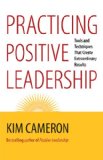Dr. Kim Cameron is the William Russell Professor of Management & Organizations at the Ross School of Business at the University of Michigan and the co-founder of a field called Positive Organizational Scholarship (POS). POS was separate in its origins from Positive Psychology (and pre-dates positive psychology). I had the honor of having him as my advisor for my MAPP capstone at the University of Pennsylvania. Louisa Jewell and I couldn’t ask for a fairer or tougher advisor. I decided to interview him to see what he’s been working on.
What subjects are businesses are most attracted to?
Bottom line is the driver, of course. All business executives say “If I don’t achieve profit, return to share, then I’m not doing my job and I will not last and nor will the organization.” Their interest is: ‘Is there any pay off for implementing these practices – from psychology and organization research? If I adopt a positive approach, does it matter?’ What is ironic is that if you express gratitude only in order to get a payoff, then it is a manipulation; it is not true gratitude. Gratitude has inherent goodness. On the other hand, we have found that gratitude really does add value to the bottom line in organizations; there is a tangible benefit, even though we don’t need a payback.
You’ve been studying this for a long time. Tell me about what you’ve discovered over the last 10 years?
There is a lot of compelling evidence – across industries, continents, sectors—that positive and virtuous practices pay off. Organizations make more money, are more productive, achieve higher quality, produce higher customer satisfaction, and create higher employee engagement. Moreover, evidence suggests that these relationships are causal—when virtuous practices improve, organizational outcomes improve as well.
How do you bridge the gap to goodness?
Most people I’ve met believe and understand that kindness is better than abuse and helpfulness is better than selfishness. It is not surprising to people when you identify them. The middle part of that argument is that putting kind people together doesn’t make for positive or high performing organizations because dynamics of organizations are so complex. That is where Positive Organizational Scholarship (POS) is important in addition to the positive psychology literature. Just applying findings from positive psychology is insufficient because organizational dynamics are different. On the other hand, a great deal of evidence exists that findings from positive psychology have applicability in positive organizations.
How do you institutionalize forgiveness?
We conducted a study ten years ago about an organization that downsized. A lot of harm was produced, abuse escalated, family life plummeted, and morale markedly declined. The question was: how does an organization design itself to manage forgiveness after a major trauma like this? We found that when you institutionalize forgiveness, it does not mean to forget, to minimize, or to deny being upset or angry. It means to look forward with an optimistic outlook and to adopt a positive attitude. It means forgiving the harm and moving forward instead of holding onto a grudge. We discovered that organizations that institutionalize forgiveness flourished after downsizing. 80% of companies maintained low scores of measures of forgiveness and, consequently, did not flourish after downsizing.
What do you do to help organizations implement these practices?
There are at least 20 tools, techniques, and interventions that create positively deviant outcomes. One common tool is the use of positive energy networks. For example, we have investigated the positive energy of leaders in various business units. We have discovered that if you are at the center or hub of a positive energy network, your performance is four times higher than if you are at the center of an influence network or an information network. This is just one tool that is available. There are many other tools and techniques that assess, foster and enhance positive outcomes.
I know you’ve written about this in your upcoming book: Practicing Positive Leadership: Tools and Techniques That Create Extraordinary Results. What about research? Companies can be hesitant to pay for that.
Business is hesitant to pay for research unless we can show a clear and compelling bottom line impact. Doing a serious controlled experiment in an organization is difficult. That’s why we use longitudinal methods. We measure changes in organizations’ scores on positive practices—or the extent to which they have institutionalized certain practices—and then assess certain outcomes a year or two later. If outcomes change, we can presume a causal direction. Compelling evidence has been produced that positive practices produce positive outcomes.*
What do you think about hiring for well-being?
It’s similar to the prescription I often make, that people should be hiring for positive energy as well as individual well-being.
How do you assess positive energy?
There are attributes of positive energizers not typical of de-energizers. Energizers are trustworthy, they pay attention, they build and foster confidence in others, they are unselfish, and they can solve problems. Others who are not positive energizers are: selfish, self-aggrandizing, not mindful, and only see obstacles. However, those selection processes are never 100%.
What do you think the future of POS in business?
We are in the very early stages of expanding and broadening POS. It is separate in its origins from positive psychology. We have found lots of synergies since and we are trying to expand Positive Business.
What would expanding Positive Business look like?
This means that positive behaviors (well-being and happiness) will be taken seriously: positive finance, positive accounting, positive marketing, and positive law. How would that differ in an organization than the standard production line? Well, we are beginning to find some people who have written books or have adopted a different approach norm. Could you produce a difference if you changed the whole nature of the enterprise? These are steps in the future to expand to other domains of scholarship but the principles are universal. We need evidence for that. And we’re finding people who are excited about positive/virtuous practices.
Thank you so much for your time. I look forward to reading your upcoming book, Practicing Positive Leadership: Tools and Techniques That Create Extraordinary Results. It’s available for pre-order for those who want it as soon as it comes out on September 2.
Cameron, K. (2013). Practicing Positive Leadership: Tools and Techniques That Create Extraordinary Results. San Francisco: Berrett-Kohler.
Cameron, K. (2008). Positive leadership: Strategies for extraordinary performance. San Francisco: Berrett-Kohler.
Cameron, K. & Spreitzer, G. (2011). The Oxford Handbook of Positive Organizational Scholarship. Oxford University Press.
Cameron, K. (no date). Leadership Through Organizational Forgiveness. Center for Positive Organizational Scholarship.



